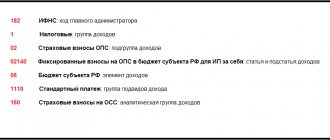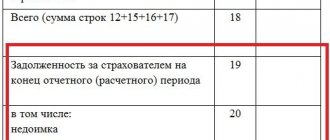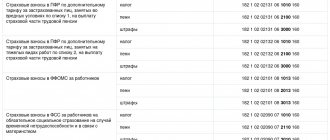Grounds for recovery
The procedure for paying insurance premiums is established by Article 15 of the Law of July 24, 2009 No. 212-FZ. If the organization has not paid (has not paid in full) the insurance premiums on time (no later than the 15th day of the month following the reporting month), the arrears are collected from it. This follows from the provisions of Part 5 of Article 15 and Part 2 of Article 18 of the Law of July 24, 2009 No. 212-FZ. The same procedure applies to contributions for insurance against accidents and occupational diseases (Article 22.1 of the Law of July 24, 1998 No. 125-FZ).
Arrears can be identified as a result of a desk or on-site inspection of the insurance premium payer (Part 1, Article 33 of Law No. 212-FZ of July 24, 2009). The rules for conducting inspections are established by Articles 34 and 35 of the Law of July 24, 2009 No. 212-FZ. Based on these rules, funds develop internal documents regulating the activities of inspectors. For example, the procedure for organizing on-site inspections by territorial branches of the Pension Fund of the Russian Federation is regulated by Methodological Recommendations, which were approved by Order of the Board of the Pension Fund of the Russian Federation dated February 3, 2011 No. 34r.
How to fill out a payment order for payment of insurance premiums
When filling out payment slips for the transfer of insurance premiums to the tax authorities, in field 101, companies making payments to individuals must indicate payer status “01”.
Individual entrepreneurs indicate one of the following values in this field:
- 09 - taxpayer (payer of fees) - individual entrepreneur;
- 10 - taxpayer (payer of fees) - a notary engaged in private practice;
- 11 - taxpayer (payer of fees) - lawyer who established a law office;
- 12 - taxpayer (payer of fees) - head of a peasant (farm) enterprise.
These provisions are provided for by Order of the Ministry of Finance of the Russian Federation dated November 12, 2013 No. 107n.
When transferring contributions for accident insurance, “08” is entered in field 101.
The BCC is entered in field 104. In this field you need to indicate the value of the budget classification code of the Russian Federation established for the payment of the corresponding type of insurance premiums.
The purpose of payment and other necessary information are indicated in field 24. This field should reflect the type of insurance premiums and the period for which they are paid. When paying “traumatic” premiums, you can indicate the registration number of the policyholder in the Federal Social Insurance Fund of the Russian Federation.
In fields 106–109 of the payment order for the transfer of accident insurance contributions, “0” must be entered.
When transferring contributions to the tax authorities, you must reflect on the payment slip:
- “TIN” and “KPP” of the recipient of funds - the value of the “TIN” and “KPP” of the relevant tax authority that administers the payment;
- “Recipient” is the abbreviated name of the Federal Treasury authority and in brackets is the abbreviated name of the tax authority that administers the payment.
In field 106, when transferring the current payment, the TP is entered, in field 107 - the month for which contributions are paid (for example, MS.03.2020).
Table “Budget classification codes for payment of contributions in 2022”
| Payment | KBK for payments on contributions (at basic tariffs) from 2020 |
| Pension | |
| Contributions | 182 1 02 02010 06 1010 160 |
| Penalty | 182 1 02 02010 06 2110 160 |
| Fines | 182 1 02 02010 06 3010 160 |
| Social insurance (VNiM) | |
| Contributions | 182 1 02 02090 07 1010 160 |
| Penalty | 182 1 02 02090 07 2110 160 |
| Fines | 182 1 02 02090 07 3010 160 |
| Medical | |
| Contributions | 182 1 02 02101 08 1013 160 |
| Penalty | 182 1 02 02101 08 2013 160 |
| Fines | 182 1 02 02101 08 3013 160 |
A sample of filling out a payment order for the transfer of insurance premiums to compulsory health insurance for September 2022
Sample of filling out a payment order for the transfer of insurance premiums to VNiM for September 2022
A sample of filling out a payment order for the transfer of insurance premiums to the Federal Social Insurance Fund of the Russian Federation for accident insurance for September 2022
Request for payment
Within three months from the date of discovery of the arrears, the fund department is obliged to send the organization a request for payment of insurance premiums (fines, penalties). The dates of detection of arrears are recorded in special certificates. This is stated in Part 2 of Article 22 of the Law of July 24, 2009 No. 212-FZ. The forms of requirements and certificates were approved by orders of the Ministry of Labor of Russia dated November 27, 2013 No. 698n and dated June 23, 2014 No. 400n.
The requirement can be submitted to the head of the organization (its legal or authorized representative):
- personally against signature;
- by registered mail. In this case, the request is considered received after six working days from the date of sending the registered letter;
- in electronic form via telecommunication channels. The formats, procedure and conditions for sending claims for payment of arrears via telecommunication channels must be established by the Pension Fund of the Russian Federation and the Social Insurance Fund of Russia.
This procedure is provided for by Part 7 of Article 22, Part 6 of Article 4 of the Law of July 24, 2009 No. 212-FZ.
If a demand for payment of insurance premiums (fines, penalties) is drawn up based on the results of an inspection, it must be sent within 10 working days from the date of entry into force of the decision on the inspection report (Part 3 of Article 22, Part 6 of Article 4 of the Law of 24 July 2009 No. 212-FZ). The forms of decisions were approved by orders of the Ministry of Labor of Russia dated November 27, 2013 No. 698n, dated June 23, 2014 No. 400n. They come into force after 10 working days after delivery to the representative of the organization (Part 12, Article 39, Part 6, Article 4 of the Law of July 24, 2009 No. 212-FZ).
The repayment of arrears in compulsory social insurance contributions, which arose due to an overestimation of the amount of expenses accepted for deduction when calculating the monthly payment to the Social Insurance Fund of Russia, has some specific features. Having discovered such a violation, the territorial branch of the fund will make a decision not to take into account the costs of paying out insurance coverage and, within three days, will send the organization a demand for their compensation, indicating the amount and repayment period of the arrears (Parts 4 and 5 of Article 4.7 of the Law of December 29, 2006 No. 255-FZ). Based on this requirement, the organization is obliged to transfer the specified amount to the budget of the Social Insurance Fund of Russia, adjust the accounting data, and, if necessary, tax accounting, make changes to the reporting (clause 5, part 2, article 4.1 of the Law of December 29, 2006 No. 255-FZ , clauses 5–10 PBU 22/2010 and paragraph 2, clause 1, article 54, clause 1, article 81 of the Tax Code of the Russian Federation).
Situation: is the organization obliged to comply with the requirement to pay mandatory insurance contributions if it is incorrectly completed?
No, I don't have to.
The procedure for filing claims for payment of insurance premiums is provided for in Part 4 of Article 22 of Law No. 212-FZ of July 24, 2009. The requirement, in particular, must indicate:
- amount of debt on insurance premiums;
- the amount of penalties and fines accrued by the time the claim was made;
- deadline for payment of insurance premiums for which arrears arose;
- measures that will be taken by the extra-budgetary fund if the organization does not pay off the arrears;
- the grounds on which insurance premiums are collected, with references to specific provisions of the Law of July 24, 2009 No. 212-FZ.
If the request for payment of insurance premiums received by the organization does not contain any data from the above list, it is considered to have been drawn up with violations. The organization should not comply with such a requirement. This follows from the provisions of paragraph 9 of part 1 of article 28 of the Law of July 24, 2009 No. 212-FZ.
In arbitration practice there are examples of court decisions confirming the legality of this approach. For example, by resolution of February 20, 2012 No. A46-5496/2011, the Federal Antimonopoly Service of the West Siberian District invalidated the requirement to pay penalties on insurance premiums, since it did not indicate how much debt was owed and for what period the territorial branch of the Pension Fund of the Russian Federation charged the organization a penalty.
Deferment (installment plan) of payment of insurance premiums
The Pension Fund of the Russian Federation and the Social Insurance Fund of Russia have the right to provide deferments (installments) for the payment of insurance contributions (penalties, fines). This is stated in paragraph 11 of part 1 of Article 29 of the Law of July 24, 2009 No. 212-FZ.
The grounds and procedure for granting a deferment or installment payment of insurance premiums (penalties, fines) are established by Articles 18.1–18.5 of the Law of July 24, 2009 No. 212-FZ.
Granting a deferment (installment plan) to the payer is possible if the following grounds exist:
- damage caused as a result of a natural disaster, technological disaster or other force majeure circumstances;
- lack (delay) of budget funding;
- seasonal nature of production and (or) sale of goods (work, services).
This follows from the provisions of Part 3 of Article 18.1 of the Law of July 24, 2009 No. 212-FZ.
A deferment (installment plan) can be obtained for any of three or several types of insurance premiums at once, the payment of which is regulated by Law No. 212-FZ of July 24, 2009:
- in the territorial branch of the Federal Social Insurance Fund of Russia - for contributions to insurance in case of temporary disability and in connection with maternity;
- in the territorial branch of the Pension Fund of the Russian Federation - for pension contributions and for contributions to compulsory health insurance.
Important: deferment (installment plan) for insurance contributions for the funded part of the pension is not provided. Moreover, the presence of debt for this part of pension contributions makes it impossible to obtain a deferment (installment plan) for contributions to the insurance part of the labor pension. In other words, until the organization pays off the arrears in contributions to the funded part of the pension, it will not be provided with a deferment (installment plan) for the payment of pension contributions. The presence of debt on the funded part of pension contributions does not prevent you from receiving a deferment (installment plan) for contributions to compulsory health insurance.
This follows from the provisions of parts 4 and 7 of Article 18.1 of the Law of July 24, 2009 No. 212-FZ.
If a deferment (installment plan) is granted due to the seasonal nature of the organization’s activities, the debt on insurance premiums will have to be repaid with interest. Interest will be calculated based on the amount of debt and half the refinancing rate in effect during the deferment period (installment plan).
In other cases, the funds do not charge interest for providing a deferment (installment plan).
This procedure is provided for by parts 5 and 6 of Article 18.1 and Article 18.3 of the Law of July 24, 2009 No. 212-FZ.
As a rule, a deferment (installment plan) can be granted for a period of no more than one year (Part 1 of Article 18.1 of the Law of July 24, 2009 No. 212-FZ).
There are circumstances that exclude the possibility of obtaining a deferment (installment plan) for the payment of insurance premiums. A deferment (installment plan) will not be provided if in relation to the organization:
- proceedings are underway regarding violation of the legislation on insurance premiums;
- proceedings are underway regarding administrative offenses in the field of insurance;
- there is a decision by the fund to terminate a previously granted deferment (installment plan). Another deferment (installment plan) will be denied if such a decision was made within the previous three years.
This follows from the provisions of parts 1 and 2 of Article 18.1 of the Law of July 24, 2009 No. 212-FZ.
To receive a deferment (installment plan) for the payment of insurance premiums, you need to submit to the territorial office of the fund:
- statement. Each fund has its own application form. Submit an application to the Pension Fund of the Russian Federation in the form approved by Resolution of the Board of the Pension Fund of February 20, 2015 No. 35p. And in the FSS of Russia - in the form approved by order of the FSS of Russia dated May 21, 2015 No. 205;
- act of joint reconciliation of calculations for insurance premiums;
- a certificate from the tax inspectorate about the organization’s open bank accounts;
- bank statements on monthly cash flows for the six months preceding the submission of the application;
- certificates from banks about the organization’s availability of payment documents placed in the file cabinet (about the absence of such documents);
- bank statements about cash balances in all accounts opened by the organization;
- the organization’s obligation to comply with the conditions under which the deferment (installment plan) is granted;
- debt repayment schedule;
- documents confirming the existence of grounds for granting a deferment (installment plan).
This procedure is provided for by Part 9 of Article 18.1, Parts 1 and 6 of Article 18.4 of the Law of July 24, 2009 No. 212-FZ.
The list of documents that will confirm the existence of grounds for granting a deferment (installment plan) depends on the specific basis. For example, to confirm the seasonal nature of an organization’s activities, documents must be submitted to the fund indicating an uneven flow of income (for example, contracts with counterparties with implementation dates in the spring-summer or, conversely, autumn-winter period).
In addition, depending on the reason for applying for a deferment (installment plan), a number of additional documents will have to be submitted to the fund. For example, if the basis for deferment (installment plan) is the seasonal nature of the activity, then a statement of calculation must be attached to the application. This calculation must confirm that the organization’s income from seasonal activities constitutes at least 50 percent of its total income. This follows from the provisions of Part 5 of Article 18.4 of the Law of July 24, 2009 No. 212-FZ and paragraph 5.1 of Article 64 of the Tax Code of the Russian Federation.
The territorial branch of the Pension Fund of the Russian Federation will make a decision on granting a deferment (installment plan) or refusing to change the deadlines for payment of insurance premiums (penalties, fines) within 30 working days from the date of receipt of the organization’s application. At the request of the organization for this period, the fund may decide to temporarily suspend the payment of insurance premiums (Parts 7, 8, Article 18.4 of the Law of July 24, 2009 No. 212-FZ, Resolution of the Pension Fund of the Russian Federation Board of February 20, 2015 No. 35p).
The territorial branch of the FSS of Russia will also make a decision on granting a deferment (installment plan) or refusing to change the deadlines for payment of insurance premiums (penalties, fines) within 30 working days from the date of receipt of the organization’s application. At the request of the organization for this period, the fund may decide to temporarily suspend the payment of insurance premiums (Parts 7, 8, Article 18.4 of the Law of July 24, 2009 No. 212-FZ, order of the FSS of Russia of May 21, 2015 No. 205).
The territorial branch of the fund is obliged to notify the organization of its decision within three days after its adoption (Part 13, Article 18.4 of the Law of July 24, 2009 No. 212-FZ).
The decision to refuse a deferment (installment plan) can be appealed both to a higher department of the fund and in court. Unlike decisions of tax inspectorates, complaints can be filed simultaneously: to go to court, you do not need to wait for the conclusion of a higher department of the fund (Part 12, Article 18.4, Article 54 of the Law of July 24, 2009 No. 212-FZ). The period for appeal is three months from the date of the decision (part 4 of article 198 of the Arbitration Procedure Code of the Russian Federation, paragraph 2 of article 55 of the Law of July 24, 2009 No. 212-FZ).
Mandatory insurance premiums for individual entrepreneurs: when and how much to pay - Elba
Insurance premiums are paid to see a doctor for free and receive a pension in old age. Contributions for hired employees are paid by the employer. The individual entrepreneur works for himself and pays his own insurance premiums.
Amount of insurance premiums for individual entrepreneurs in 2022
Contributions consist of two parts: fixed and additional, which depends on income.
The fixed amount must always be paid, even if you did not conduct business and did not receive income for the entire year.
In 2022, the fixed part is 40,874 rubles. Of them:
- 32,448 rubles - for pension insurance
- 8,426 rubles - for medical insurance.
Additional contributions to the Pension Fund still amount to 1% of income over 300 thousand rubles.
The total amount of pension contributions has a maximum limit. For any income, you will not pay more than eight times the fixed portion. In 2022, the maximum amount of contributions to the Pension Fund is 259,584 rubles, in 2022 - 234,832 rubles.
Example:
an individual entrepreneur with an annual income of 1 million rubles will pay
40,874
rubles + 7,000 rubles (1% of (1 million - 300 thousand))
Elba was created for small businesses. She herself prepares payments to the Pension Fund and the Compulsory Medical Insurance Fund, reduces the tax on contributions and generates reports. The first 30 days are free.
Income for calculating 1% contributions
- on OSNO - all income on which you pay personal income tax.
- on UTII - imputed income, which is easiest to determine this way: add up the indicators of line 100 according to UTII declarations for each quarter of the year.
- on a patent - potential income established in the region for your type of activity. The amount of potential income must be adjusted for the period for which you purchased the patent.
- on the simplified tax system - income on which you pay tax to the simplified tax system. Usually this is payment from customers for goods and services, but there is also non-operating income: for example, interest on deposits and material benefits. Expenses are not taken into account, even if you are on the simplified tax system “Income minus expenses,” although this is still being debated. We talked about the confusion in the video:
If you combine several tax systems, add up the income for each of them.
Deadlines for payment of insurance premiums for 2022
- December 31, 2022 – for the fixed part of contributions.
- July 1, 2022 - to pay 1% of income over 300,000 rubles.
Kbk for payment of insurance premiums
- 182 1 0210 160 - fixed part + 1% of income above 300 thousand rubles.
- 182 1 0213 160 - health insurance contributions.
Read our article for more information on filling out contribution payments.
When paying, insurance premiums are not divided into insurance and savings parts. The Pension Fund independently distributes contributions according to the pension financing option that you have chosen.
Insurance premiums for less than a year
If you have not registered an individual entrepreneur since the beginning of the year, the amount of contributions will decrease in proportion to calendar days. If the individual entrepreneur is closed during the year, the amount of contributions will also be less. Calculate contributions for partial years in the contribution calculator.
Reducing taxes on insurance premiums
The tax on the simplified tax system “Income” and UTII can be reduced by the amount of contributions. The tax is reduced only by those contributions that were paid in the same period for which you are calculating the tax. For example, the simplified tax system tax for the first half of 2022 can be reduced by contributions paid from January 1 to June 30, 2022.
Individual entrepreneurs without employees can reduce the tax in full on insurance premiums for themselves, and individual entrepreneurs with employees can reduce the tax on insurance premiums for themselves and their employees by no more than 50%.
Under the simplified tax system “Income minus expenses”, insurance premiums do not reduce tax, but are included in expenses. Read more about reduction rules in the article.
Responsibility for non-payment of insurance premiums
For each day of delay, penalties are charged - approximately 9% per annum. For example, if you pay the fixed part of the contributions for 2022 30 days later, a penalty of 290 rubles will be charged.
They can also block a bank account, but only if you don’t pay dues at the request of the tax office.
There is no need to submit reporting on individual entrepreneur contributions for yourself.
Just pay the required amount to the tax office.
When can you avoid paying insurance premiums for yourself?
Please note that lack of income does not eliminate the obligation to pay insurance premiums. The law provides only exceptional cases when an individual entrepreneur has the right not to pay contributions:
- military service;
- leave to care for each child up to 1.5 years, but not more than 6 years in total;
- caring for a disabled person of group I, a disabled child or a person who has reached the age of 80;
- residence of spouses of military personnel serving under contract with their spouses in areas where they could not work due to lack of employment opportunities, but not more than 5 years in total;
- period of residence abroad with spouses sent to diplomatic missions and consular offices of the Russian Federation, permanent missions of the Russian Federation to international organizations, trade missions of the Russian Federation in foreign countries, etc., but not more than 5 years in total.
To take advantage of the exemption from insurance premiums, you will have to provide supporting documents to the tax authorities, as well as prove the absence of activity and income.
How Elba can help
- Reminds you of deadlines.
- It will calculate insurance premiums taking into account the date of registration of the individual entrepreneur and your income.
- Will prepare payments with the correct details.
- Reduce tax on insurance premiums.
Amount of insurance premiums for previous years
Amount of insurance premiums in 2022
The fixed part is 36,238 rubles, of which:
- 29,354 rubles - for pension insurance
- 6,884 rubles - for medical insurance.
Amount of insurance premiums in 2022
The fixed part is 32,385 rubles, of which:
- 26,545 rubles - for pension insurance
- 5,840 rubles - for medical insurance.
Amount of insurance premiums in 2022
The fixed part is 27,990 rubles, of which:
- 23,400 rubles - for pension insurance
- 4,590 rubles - for medical insurance.
Additionally - 1% of income over 300 thousand rubles. The maximum contribution amount for 2022 is 191,790 rubles.
Amount of insurance premiums in 2016
Fixed part - 23,153 rubles 33 kopecks, of which:
- 19,356 rubles 48 kopecks - to the Pension Fund
- 3,796 rubles 85 kopecks - to the Compulsory Medical Insurance Fund.
Additionally - 1% of income over 300 thousand rubles. The maximum amount of contributions for 2016 is 158,648 rubles 69 kopecks.
Amount of insurance premiums in 2015
The fixed part is 22,261 rubles 38 kopecks, of which:
- 18,610 rubles 80 kopecks - to the Pension Fund
- 3,650 rubles 58 kopecks - to the Compulsory Medical Insurance Fund.
Additionally - 1% of income over 300 thousand rubles. The maximum amount of contributions for 2015 is 152,536 rubles 98 kopecks.
Amount of insurance premiums in 2014
The fixed part is 20,727 rubles and 53 kopecks, of which:
- 17,328 rubles 48 kopecks - to the Pension Fund
- 3,399 rubles 05 kopecks - to the Compulsory Medical Insurance Fund.
Additionally - 1% of income over 300 thousand rubles. The maximum contribution amount for 2014 is 142,026 rubles and 89 kopecks.
Contributions are no longer divided into insurance and savings parts; now they should be transferred in one payment to the CBC of the insurance part.
Amount of insurance premiums in 2013
The total amount of contributions for the year is 35,664 rubles 66 kopecks:
- 32,479.20 rubles - to the Pension Fund of Russia
- 3,185.46 rubles - to the Compulsory Medical Insurance Fund.
The contribution to the Pension Fund is divided into insurance and savings parts.
Amount of insurance premiums in 2012
The amount of contributions is 17,208 rubles 25 kopecks:
- 14,386.32 rubles - to the Pension Fund of Russia
- 2821.93 rubles - to the Compulsory Medical Insurance Fund.
The contribution to the Pension Fund is divided into insurance and savings parts, which are paid separately. Entrepreneurs older than 1967 pay only the insurance part, the rest pay both.
The article is current as of 01/27/2020
Source: https://e-kontur.ru/enquiry/29
Decision on collection
If the arrears are not repaid within the established period, the fund department will make a decision on the forced collection of insurance premiums (Part 1, Article 19 of the Law of July 24, 2009 No. 212-FZ). The forms of decisions are approved by orders of the Ministry of Labor:
- dated June 23, 2014 No. 400n – to collect arrears on contributions for insurance against accidents and occupational diseases;
- dated November 27, 2013 No. 698n – to collect arrears in contributions to compulsory pension (social, medical) insurance.
As a general rule, fund employees must prepare a decision on collection no later than two months from the moment when the deadline for fulfilling the requirement for voluntary repayment of arrears has expired (Part 5, Article 19 of Law No. 212-FZ of July 24, 2009).
This rule does not apply to insignificant amounts of arrears - in such cases, representatives of funds can make a decision to collect several claims at once, if the total debt on them (including penalties and fines) does not exceed:
- 1500 rub. – on payments to the Pension Fund of the Russian Federation;
- 500 rub. – for payments to the Federal Social Insurance Fund of Russia.
The deadline for making decisions in these situations is 14 months from the date on which the deadline for voluntary compliance with the earliest requirement has expired.
Decisions made after the established deadlines are considered invalid. It is not necessary to fulfill them.
This follows from the provisions of parts 5.1–5.3 of Article 19 of the Law of July 24, 2009 No. 212-FZ.
If the deadlines established for making decisions on collection are missed, representatives of the funds can collect the arrears in court. Moreover, in the first case, they must go to court no later than six months from the moment when the deadline for fulfilling the requirement for voluntary repayment of the arrears expired. In the second case - no later than six months from the moment when the deadline for making a decision on collecting the arrears expired.
This is stated in parts 5.4–5.6 of Article 19 of the Law of July 24, 2009 No. 212-FZ.
The decision to collect arrears must be communicated to the organization within six working days after its adoption. The decision on recovery can be transferred to the head of the organization (authorized representative):
- personally against signature;
- by registered mail. In this case, it is considered received after six working days from the date of sending the registered letter;
- in electronic form via telecommunication channels. The formats, procedure and conditions for sending decisions via telecommunication channels must be established by the Pension Fund of the Russian Federation and the Social Insurance Fund of Russia.
This procedure is provided for by Part 6 of Article 19, Part 6 of Article 4 of the Law of July 24, 2009 No. 212-FZ.
The fund department can forcefully collect the arrears through:
- Money;
- property;
- accounts receivable.
Collection of debt on insurance contributions to the Pension Fund and Social Insurance Fund
Collection of debt on insurance contributions to the Pension Fund and the Social Insurance Fund can be carried out in an indisputable manner, and in certain cases through the court. This article will provide information to legal entities and entrepreneurs in the city of Krasnodar and the Krasnodar Territory on how the procedure for collecting insurance premiums occurs.
In accordance with Article 3 of Federal Law No. 212-FZ of July 24, 2009 “On insurance contributions to the Pension Fund of the Russian Federation, the Social Insurance Fund of the Russian Federation, and the Federal Compulsory Medical Insurance Fund,” control over the correctness of calculation, completeness and timeliness of payment ( transfers) of insurance contributions to state extra-budgetary funds are carried out by:
- Pension Fund of the Russian Federation in relation to insurance contributions for compulsory pension and compulsory medical insurance;
- Social Insurance Fund in relation to insurance contributions for compulsory social insurance.
These bodies have the right to collect arrears, as well as penalties and fines in accordance with paragraph 6 of Part 1 of Art. 29 of Law No. 212-FZ.
Let us remind you that the deadline for payment of insurance premiums by payers of insurance premiums making payments and other remuneration to individuals (i.e. for employers) is no later than the 15th day of the calendar month following the calendar month for which the monthly mandatory payment is calculated (Article 15 212-FZ).
If the payer of insurance premiums does not pay or does not fully pay insurance premiums within the established period, then this obligation is compulsorily fulfilled.
First of all, the Pension Fund and Social Insurance Fund sends the payer of insurance contributions a demand for payment of arrears on insurance contributions, penalties and fines (Article 22 212-FZ). The demand can be sent to the debtor within three months from the moment the arrears are identified (Part 2 of Article 22 of Law No. 212-FZ).
The demand can be submitted in person against signature, sent by registered mail or transmitted electronically via telecommunication channels. If the request is sent by registered mail, it is considered received after six working days (Part 7, Article 22 of Law No. 212-FZ).
The requirement to pay arrears on insurance premiums, penalties and fines must be fulfilled within 10 calendar days from the date of receipt, unless a longer period of time is specified for payment of the arrears.
After the deadline established in the request for payment expires (but no later than two months after the expiration of the deadline), the Pension Fund of the Russian Federation and the Social Insurance Fund make a decision to collect the debt from bank accounts (Article 19 212-FZ), which within six days is also brought to the attention of the payer.
Collection can be made from settlement (current) accounts in Russian currency, and if they are insufficient, in foreign currency. When recovering from a foreign currency account, the rate of the Central Bank of the Russian Federation established on the date of sale of foreign currency is used. Expenses associated with the sale of foreign currency are borne by the payer of insurance premiums.
If there are insufficient funds in the accounts of the insurance premium payer or no funds at all, then the order to transfer insurance premiums is executed as funds are received into the account.
In the event of no accounts or lack of funds in the accounts, the Pension Fund of the Russian Federation and the Social Insurance Fund may collect insurance premiums from the debtor’s property (including cash) by sending a decision on collection to the bailiff service (Article 20 212-FZ). The decision to collect insurance premiums (penalties and fines) from the payer’s property is made in the form of an appropriate resolution, which is sent to the bailiff. The resolution on collection is adopted within one year after the expiration of the deadline for fulfilling the requirement to pay insurance premiums, penalties and fines.
If you do not agree with the amounts of debt that the Pension Fund or the Social Insurance Fund has presented to you or you believe that your rights were violated during the collection process, you can defend your interests. The Law Office of E. Romanov can provide an employee with experience in disputes with the Pension Fund and the Social Insurance Fund, and provide you with qualified assistance in defending your position.
Prices for the services of lawyers and advocates depend on the tasks.
Call now! Let's help!
+7 (861) 212-54-74, +7 (988) 241-05-75
Registration with the tax authority and tax registration
Responsibility of the management company for overestimating the amount of utility bills
Coordination and registration of outdoor advertising
Olga Romanova
Managing Partner at Romanova Law Office | Website | +posts
Graduated from the Moscow State Academy of Law. Legal experience since 1989. She began her career in the Magadan region as a legal adviser in the legal department of the Tenkinsky trading office, and since 1993 - deputy director for administrative and legal issues of the Magadan Medical School and teacher of the fundamentals of legislation. From 1998 to 2010 - lawyer. 2011-legal bureau of E. Romanova
- Olga Romanova
https://www.e-romanova.com/author/olga-romanova/Legal examination of documents
- Olga Romanova
https://www.e-romanova.com/author/olga-romanova/
Share building. Checking developers. DDU agreement
- Olga Romanova
https://www.e-romanova.com/author/olga-romanova/
Responsibility of the management company for overestimating the amount of utility bills
- Olga Romanova
https://www.e-romanova.com/author/olga-romanova/
Change of legal address in 2022
Tags: collection of arrears on insurance contributions to a pension fund how to pay a claim for payment of arrears on insurance contributions where to pay arrears on insurance premiums arrears on insurance premiums this is a demand for payment of arrears on insurance premiums insurance premiums including penalties what is this demand on payment of arrears on insurance premiums contributions demand for payment of arrears on insurance premiums penalties and fines
Collection from cash
The decision to collect the arrears is executed through the bank in which the organization has an account. After the decision to collect the arrears has been made, the fund branch must send to this bank an order to transfer insurance contributions (fines, penalties) (including in electronic form) (Part 7 of Article 19 of the Law of July 24, 2009 No. 212-FZ). The bank is obliged to fulfill this order:
- no later than the next business day, if the collection is made from the organization’s ruble account;
- within two business days if the arrears are collected from a foreign currency account.
This procedure is provided for by Part 12 of Article 19 of the Law of July 24, 2009 No. 212-FZ.
If there is not enough money in the organization’s account to fully repay the arrears, the order is placed in the file cabinet of unpaid settlement documents. In this case, the arrears will be repaid gradually as money arrives in the organization’s account. The bank will determine the balance of funds to repay the arrears after deducting the first and second priority payments. This follows from the provisions of Part 13 of Article 19 of the Law of July 24, 2009 No. 212-FZ and paragraph 2 of Article 855 of the Civil Code of the Russian Federation.
If there is a shortage of money in a ruble bank account and the organization has a foreign currency account, the arrears can be recovered from foreign currency funds (Part 9, Article 19 of Law No. 212-FZ of July 24, 2009). To do this, the fund branch must give the bank an order to sell the currency. The amount of arrears, which is repaid using foreign currency, is determined at the Bank of Russia exchange rate on the date of sale of the currency. This procedure is provided for by Part 10 of Article 19 of the Law of July 24, 2009 No. 212-FZ.
It is prohibited to collect arrears from funds placed on the organization’s deposit account before the expiration of the deposit agreement (Part 11, Article 19 of Law No. 212-FZ of July 24, 2009).
If the arrears are not repaid at the expense of funds, the fund department may recover it at the expense of other property of the organization (Part 14, Article 19 of the Law of July 24, 2009 No. 212-FZ). The decision on recovery at the expense of other property is made within one year after the end of the deadline for fulfilling the requirement to pay insurance premiums (fines, penalties) (Part 3 of Article 20 of the Law of July 24, 2009 No. 212-FZ).
Recovery from property
Collection of arrears at the expense of other property is carried out by a bailiff based on a decision and on the basis of a resolution issued by the department of the fund (Part 2 of Article 20 of the Law of July 24, 2009 No. 212-FZ). In this case, the procedure provided for by the Law of October 2, 2007 No. 229-FZ must be observed. The list of property that can be recovered to pay off the arrears is given in Part 8 of Article 20 of the Law of July 24, 2009 No. 212-FZ. The organization has the right to indicate the property that should be collected first, but the final decision on the order of collection is made by the bailiff (Part 5 of Article 69 of the Law of October 2, 2007 No. 229-FZ).
Situation: can a territorial branch of an extra-budgetary fund collect debt on mandatory insurance premiums from the receivables of a commercial organization?
Yes maybe.
If there is insufficient money in a bank account, the fund branch has the right to collect debt on insurance premiums at the expense of the organization’s property (Part 14, Article 19 of the Law of July 24, 2009 No. 212-FZ).
The general procedure for the enforcement of decisions of regulatory agencies is established by Law No. 229-FZ of October 2, 2007. This is stated in Part 2 of Article 20 of the Law of July 24, 2009 No. 212-FZ.
According to subparagraph 1 of paragraph 1 of Article 75 of the Law of October 2, 2007 No. 229-FZ, collection can be applied to the debtor’s receivables. In this case, receivables are taken into account as part of the second stage of the debtor’s property, subject to seizure and sale (clause 2, part 1, article 94 of the Law of October 2, 2007 No. 229-FZ). Thus, the branch of the extra-budgetary fund has the right to collect arrears on insurance premiums from the organization’s receivables. The procedure for foreclosure on receivables is established by Article 76 of Law No. 229-FZ of October 2, 2007.
It should be noted that collecting arrears through accounts receivable can be beneficial to the organization. After all, in fact, she was given the opportunity to pay off extra-budgetary funds at the expense of the outstanding debts of buyers (customers). In the absence of funds in bank accounts, this use of the asset is very effective.
An example of collecting arrears of insurance premiums from an organization’s receivables
The property of an organization that produces products was seized in the amount of RUB 3,000,000.
The organization's balance sheet includes:
- accounts receivable – in the amount of RUB 4,500,000;
- finished products - worth 150,000 rubles;
- materials - in the amount of 150,000 rubles;
- equipment for production - in the amount of 1,700,000 rubles.
The assessment of the property by the bailiffs coincided with its value according to accounting data. As a result, the receivables were enough to pay off extra-budgetary funds.
Situation: what should be done to prevent the territorial branch of an extra-budgetary fund from collecting out of court the amount of arrears on mandatory insurance contributions?
Appeal the decision to collect the arrears and apply to the court for interim measures.
The organization has the right to appeal the requirement to pay insurance premiums in court (Part 1 of Article 54 of the Law of July 24, 2009 No. 212-FZ). Simultaneously with filing a statement of claim, an organization can apply to the court with a request to take interim measures in relation to the disputed amounts (Articles 90, 91, 199 of the Arbitration Procedure Code of the Russian Federation). If the court agrees with this request, then until the end of the trial the fund department will not be able to collect the arrears (parts 4, 5 of article 96 of the Arbitration Procedure Code of the Russian Federation).
In this case, the period during which the court’s ruling on the adoption of interim measures is in force is not included in the two-month period provided for by part 5 of Article 19 of the Law of July 24, 2009 No. 212-FZ, allotted to the fund branch for collecting arrears out of court. That is, if the demand for payment of insurance premiums is recognized as legitimate, the fund department will be able to make a decision to collect the arrears within two months from the moment the court cancels the interim measures. Such clarifications are contained in the Resolution of the Presidium of the Supreme Arbitration Court of the Russian Federation dated May 12, 2009 No. 17533/08. Despite the fact that the said resolution dealt with the case of collecting taxes and penalties, the explanations given in it can also be used in relation to collecting arrears on insurance premiums.
Insurance premiums including penalties Article 46 Part 1 Part 3
Tax arrears are late payments of taxes, both from citizens and entrepreneurs, to the country's budget.
Arrears may arise due to late payment of tax, which will entail penalties.
Tax arrears also include amounts of payments excessively reimbursed by the tax authority, for example, value added tax.
Overpaid value added tax and excise taxes can be refunded from the budget. The amount of VAT paid can be returned if the amount of this tax is less than the amount of deductions. The amount of excise tax paid can be returned if the deductions are higher than the amount of the tax itself.
Penalties
When you are assessed any tax, a specific deadline for paying it to the budget is set. From the next day after the tax payment deadline, penalty amounts begin to accrue until the payer transfers this tax along with penalties to the budget.
If you received an over-refunded amount of tax, penalties will be charged from the day the amount is transferred to your bank account.
Arrears can and must be paid by a person at his own request and with accrued penalties. If the taxpayer ignores paying taxes, tax authorities can collect them forcibly. If it is impossible to write off this amount from the taxpayer, the tax authorities may recognize it as uncollectible and write it off.
Write-off of bad debts
The organization's arrears in insurance premiums (fines, penalties) can be considered uncollectible and written off only:
- upon liquidation of the organization;
- due to the expiration of the period for collection by a court decision;
- when excluding an organization that does not actually carry out activities from the Unified State Register of Legal Entities.
This follows from the provisions of parts 1, 2 of Article 23 of the Law of July 24, 2009 No. 212-FZ and subparagraphs “a”, “d”, “e” of paragraph 1 of the Decree of the Government of the Russian Federation of October 17, 2009 No. 820.
The decision to write off arrears of insurance premiums (fines, penalties) (form approved by order of the Ministry of Labor of Russia dated March 12, 2015 No. 162n) is made by:
- Pension Fund of the Russian Federation - in relation to contributions to compulsory pension and health insurance;
- FSS of Russia - in relation to contributions to compulsory social insurance in case of temporary disability and in connection with maternity.
This is stated in paragraphs 2 and 3 of the Decree of the Government of the Russian Federation of October 17, 2009 No. 820.







